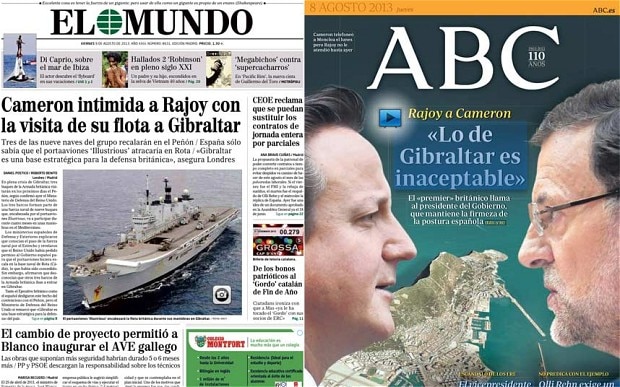Brexit: The Ongoing Challenges Of The Gibraltar Dispute

Table of Contents
The Border Issue: A Source of Ongoing Friction
The border between Gibraltar and Spain has become a major point of contention since Brexit. The friction stems from differing interpretations of sovereignty and the implementation of border controls, leading to significant challenges for the territory.
Increased Border Controls and Delays
The introduction of stricter border checks post-Brexit has resulted in considerable delays for commuters and goods crossing the frontier. This has had a detrimental effect on various aspects of Gibraltar's life.
- Increased wait times at the border: Commuters, many of whom are Gibraltarian citizens working in Spain, now face significantly longer wait times, impacting their daily lives and productivity.
- Impact on cross-border workers: The increased delays and uncertainty have created difficulties for cross-border workers, affecting their ability to maintain employment and impacting their livelihoods.
- Effects on the local economy (tourism, trade): Delays at the Gibraltar border negatively affect tourism, as visitors face longer wait times entering and leaving the territory. The movement of goods has also been hampered, impacting businesses reliant on cross-border trade. This is particularly impactful considering the significance of Gibraltar's economy, which relies heavily on the free flow of goods and people.
These issues highlight the need for a practical and efficient border management system to minimize disruption and protect the interests of Gibraltarians and Spanish citizens alike. Keywords: Gibraltar border, border controls, cross-border workers, Gibraltar economy.
The Question of Sovereignty
Underlying the border issues is the persistent question of sovereignty over Gibraltar. This long-standing dispute between the UK and Spain adds another layer of complexity to the post-Brexit situation.
- Spain's historical claims: Spain has long asserted its claim to sovereignty over Gibraltar, a claim vehemently rejected by the UK and the Gibraltarian people.
- UK's steadfast defense of Gibraltar's self-determination: The UK has consistently defended Gibraltar's right to self-determination, asserting its commitment to the wishes of its people.
- International law implications: The dispute involves complex legal arguments based on international law, treaties, and historical precedents, with each side asserting their respective rights.
The unresolved question of sovereignty casts a long shadow over all aspects of the Gibraltar dispute, making it difficult to find mutually agreeable solutions to the practical challenges. Keywords: Gibraltar sovereignty, Spain Gibraltar, UK Gibraltar, self-determination, international law.
Economic Consequences of the Brexit Gibraltar Dispute
Brexit has had profound economic consequences for Gibraltar, impacting key sectors and creating new uncertainties.
Impact on Gibraltar's Financial Services Sector
Gibraltar's thriving financial services sector has been significantly affected by Brexit. The loss of automatic "passporting rights" – allowing businesses to operate freely across the EU – is a major concern.
- Loss of passporting rights: The loss of passporting rights has significantly reduced Gibraltar's financial services industry's ability to access EU markets, impacting its competitiveness.
- Potential regulatory divergence: Differences in financial regulations between the UK and the EU could further isolate Gibraltar's financial sector, potentially leading to a reduction in investment.
- Impact on investment and employment: The uncertainties surrounding Gibraltar's financial services sector have led to concerns about reduced investment and potential job losses.
The future of Gibraltar's financial sector hinges on its ability to adapt to the post-Brexit environment and find ways to maintain its access to key markets. Keywords: Gibraltar finance, financial services, passporting rights, EU market access.
Challenges to Trade and Supply Chains
Brexit has disrupted trade and supply chains between Gibraltar, the EU, and the rest of the world. New customs procedures and potential tariffs have added to the complexities.
- Tariffs: The imposition of tariffs on goods could increase prices and reduce the competitiveness of Gibraltar businesses.
- Customs procedures: Increased bureaucratic procedures at the border add time and costs to importing and exporting goods, creating further challenges for businesses.
- Potential shortages of goods: Disruptions to supply chains could lead to potential shortages of essential goods, impacting consumers and businesses.
Maintaining efficient trade flows is vital for Gibraltar’s economic stability. Keywords: Gibraltar trade, supply chain disruption, customs procedures, tariffs.
Political Implications and International Relations
The Brexit Gibraltar dispute has significantly impacted UK-Spain relations and involved various international actors.
UK-Spain Relations
The ongoing dispute has strained diplomatic relations between the UK and Spain.
- Strained diplomatic relations: The issue has caused significant friction in UK-Spain relations, impacting broader areas of cooperation.
- Potential for further conflict: The unresolved issues have the potential to escalate, leading to further conflicts.
- Role of the EU in mediating the dispute: The EU has played a role in mediating the dispute, although its involvement is complex given the UK's departure.
Finding a solution that addresses both the UK and Spain's concerns is crucial for improving bilateral relations. Keywords: UK Spain relations, diplomatic relations, EU mediation.
The Role of the EU and International Organizations
The EU and other international organizations have been involved in attempting to find a resolution to the dispute.
- EU's position on Gibraltar: The EU's position on Gibraltar is complex, balancing its relationship with the UK and Spain.
- Involvement of the UN: The UN's involvement has been limited, but its potential role in mediating disputes related to sovereignty cannot be dismissed.
- Potential for international arbitration: International arbitration could provide a mechanism to resolve the dispute, although both sides must agree to participate.
The international community has a significant role to play in facilitating a peaceful and lasting resolution. Keywords: EU Gibraltar, UN Gibraltar, international arbitration.
Conclusion
The Brexit Gibraltar dispute presents a multifaceted challenge with significant implications for the territory's economy, its relations with the UK and Spain, and its international standing. The ongoing border issues, economic uncertainties, and political tensions highlight the complexities of disentangling the UK from the EU and the lasting impact on its overseas territories. Addressing these challenges requires continued dialogue, compromise, and a commitment to finding a lasting solution that respects the interests of all parties involved. Further research and understanding of the nuances of the Brexit Gibraltar dispute are crucial for navigating this complex situation and finding a path toward a stable and prosperous future for Gibraltar.

Featured Posts
-
 Did Sheffield United Get Away With One Red Card Incident Against Leeds Examined
May 13, 2025
Did Sheffield United Get Away With One Red Card Incident Against Leeds Examined
May 13, 2025 -
 Chto Ozhidat Ot Novykh Standartov Po Fizike I Khimii V Detskikh Sadakh
May 13, 2025
Chto Ozhidat Ot Novykh Standartov Po Fizike I Khimii V Detskikh Sadakh
May 13, 2025 -
 Bar Roma Drinks Ambiance And More A Blog To Review Toronto
May 13, 2025
Bar Roma Drinks Ambiance And More A Blog To Review Toronto
May 13, 2025 -
 Eva Longorias Searching For Spain Your Guide To Watching
May 13, 2025
Eva Longorias Searching For Spain Your Guide To Watching
May 13, 2025 -
 The Nightmare Continues The Impact Of The Gaza Hostage Crisis On Families
May 13, 2025
The Nightmare Continues The Impact Of The Gaza Hostage Crisis On Families
May 13, 2025
